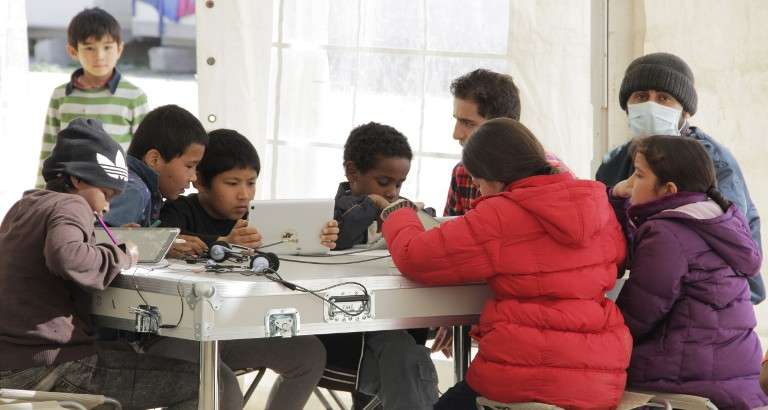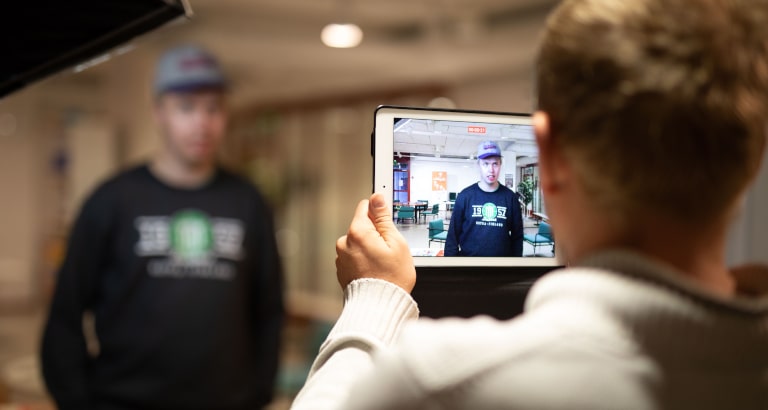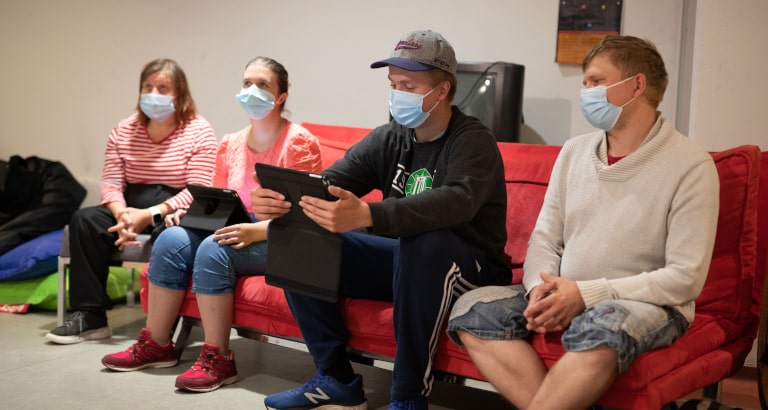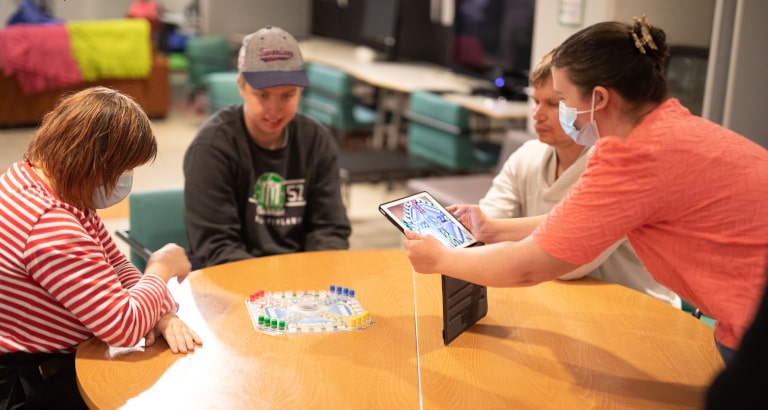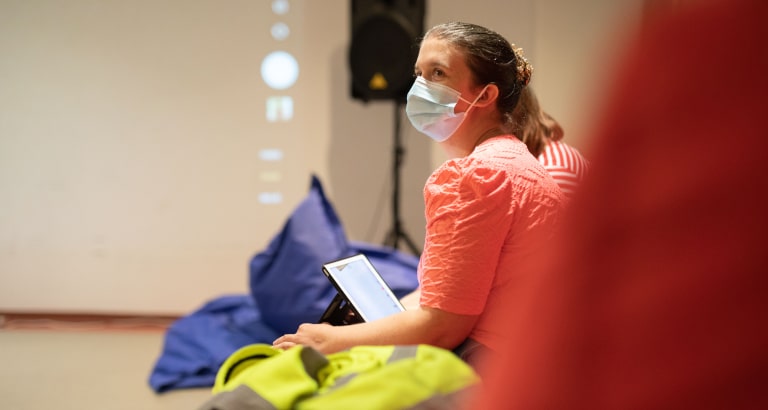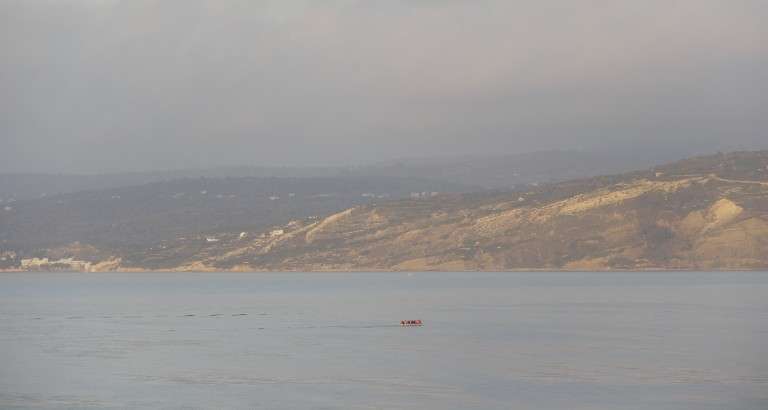“It is in librarian’s DNA to help people get access to information. And today one of the main ways to access information is through a computer, smartphone or tablet,” Jackie Godimus, a librarian in Belgium.
In 2020, Libraries Without Borders teamed up with five partners to create the digital platform, Digital Travellers, targeted at librarians across Europe. These partners are: Bibliothèques Sans Frontières Belgique, Fundacja Rozwoju Społeczeństwa Informacyjnego (Poland), Koninklijke Nationale Bibliotheek (the Netherlands), Public Libraries 2030 (Belgium) et Suomen Kirjastoseura (Finland). The Digital Travellers platform gives librarians access to a huge range of resources and training materials helping them to organise and deliver workshops, fostering digital inclusion, to tens of thousands of people.
This article reviews the project, which was financed by the European Union (EACEA Erasmus+ Programme), and the experiences of those involved.
STRENGTHENING THE SKILLS OF PEOPLE EXCLUDED FROM THE DIGITAL WORLD
At a time when more and more administrative tasks and social interactions take place online, not fully mastering digital tools can have far-reaching consequences for someone’s daily life. Older and vulnerable people can lose their independence, become isolated and be at greater risk from misinformation. When it comes to young people, a lack of digital skills can lead to a heightened risk of cyberbullying and difficulties when job searching.
To respond to these issues, for several years BSF has been training and supporting librarians, facilitators and educators to deliver digital skills workshops. They give the most disadvantaged groups the means to acquire basic digital skills, master everyday digital tools and become digitally independent.
“The digital divide leads to social and cultural isolation. It is our task as public servants to do everything in our power to close this divide,” Lindsay Merseman, a librarian in Belgium.
In Europe, every other person cannot use digital technology fully independently. To overcome the lack of resources on topics linked to the digital sphere, BSF and its five partner organisations created an online platform with the support of the European Union in 2020. This platform targets librarians across Europe, notably in France, Belgium, Finland, Poland and the Netherlands.
The Digital Travellers platform gathers together close to 300 resources which are available in multiple languages. Suitable for all ages, these resources include activity sheets, webinars and video content which are easy to use. They focus on numerous topics including: how to use your computer, creating an email account, navigating the Internet, protecting personal data, recognising fake news and avoiding being the victim of phishing attacks.
For over a year now, the Digital Travellers team has tested out these resources and trained about sixty volunteer librarians to use the content and adapt their workshops to the needs of their audiences.
“The librarians I worked with were extremely happy with how easy it was to access the resources, and how well organised and accessible the suggested activities were. I think that these resources are very straightforward with step-by-step activities and for those who are unsure about facilitating workshops or who do not think they have the necessary skills, they can really help!” Pauline Gadéa, project advisor in BSF’s ‘Digital Education’ department.
COVID-19 : BOUNCING BACK !
While the pandemic didn’t impact on researching, creating and translating the digital education resources that make up the platform, it has nevertheless had a knock-on effect on the scheduling and organisation of the training workshops for librarians, which had originally been planned as in-person events. We have had to adapt by offering these meetings remotely.
Above all, the closure of libraries in March 2020 changed the librarians’ everyday work as they could no longer reach their users via traditional means and had to experiment with offering digital education workshops remotely. For some of them, this was a real challenge.
“The pandemic shone a light on the need to first and foremost help librarians to develop their own skills with regards to leading workshops remotely and to overcome their own reservations about the digital world. Of course, the pandemic also highlighted the heightened risk of social exclusion for those affected by the digital divide… Essentially, all the tasks that we do in our daily lives – work, study, shopping, etc. – moved online overnight!” Virginie Dumont, Digital Travellers Project Lead.
“At first, I was terribly worried that there would be so many new skills to learn and I feared how the participants would react when I got something wrong… At the Digital Travellers training sessions, I realised that other facilitators had the same fears. This definitely lifted my spirits and gave me motivation to work,” Joanna Popławska, a librarian in Poland.
In light of their questions and requests, opportunities for exchange between librarians in different participating countries have been regularly organised. These sessions gave them the chance to reflect on their work, share their good practices and break the isolation caused by the long period of closure. The meetings also helped to create a community of librarians which continues to meet virtually to this day.
“I found the international meetings very interesting. For us it was an opportunity to exchange with other librarians who carry out similar projects. It was fascinating to discover that we faced similar problems, but we had completely different approaches to tackling them. These international meetings were an extremely valuable experience,” Joanna Chapska, a librarian in Poland.
“What appeals to me a lot about the Digital Travellers project is that different European countries work together to give everybody the same chances in a digital society. In 2020, you simply cannot participate fully in society without having basic digital skills. By securing this from a shared vision within the libraries, we provide citizens with a familiar and trusted place to go to with all their queries and concerns surrounding digital topics.” Ian Scharroo, a librarian in the Netherlands.
The pandemic and subsequent closure of libraries for several months prevented us from training as many people as originally intended. Nevertheless, we made the most of this situation and used it to strengthen participating librarians’ skills, helping them to transition from teaching in-person to teaching remotely. In doing so, we have laid the necessary foundations so that future digital skills workshops can reach as many people as possible.
Beyond the pilot project, the goal is to extend the initiative to the major library networks and other stakeholders working in non-formal education by making the Digital Travellers resources and training materials available to them. This in turn will facilitate access to digital technology for all Europeans who, to this day, feel digitally excluded.
“The digital age is here, and we have to learn how to live with it. So, you can either stand to one side and watch, or you can adapt. You have to have a go. If you fail, you get back up and you start again – it’s like everything else. When you learnt how to walk, you didn’t start by running. It’s the same with technology,” Jackie Godimus, a librarian in Belgium.
Pictures : Mikko Hovi
For the last 14 years, BSF has been supporting people excluded from the digital world, helping them to become independent, active and informed citizens who are able to make their voices heard.
